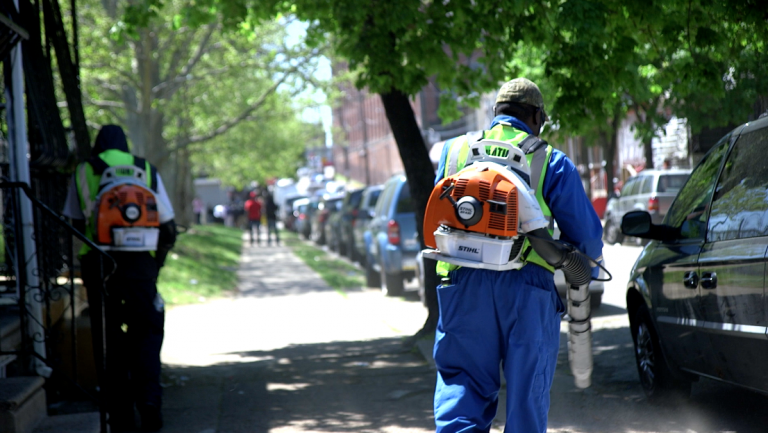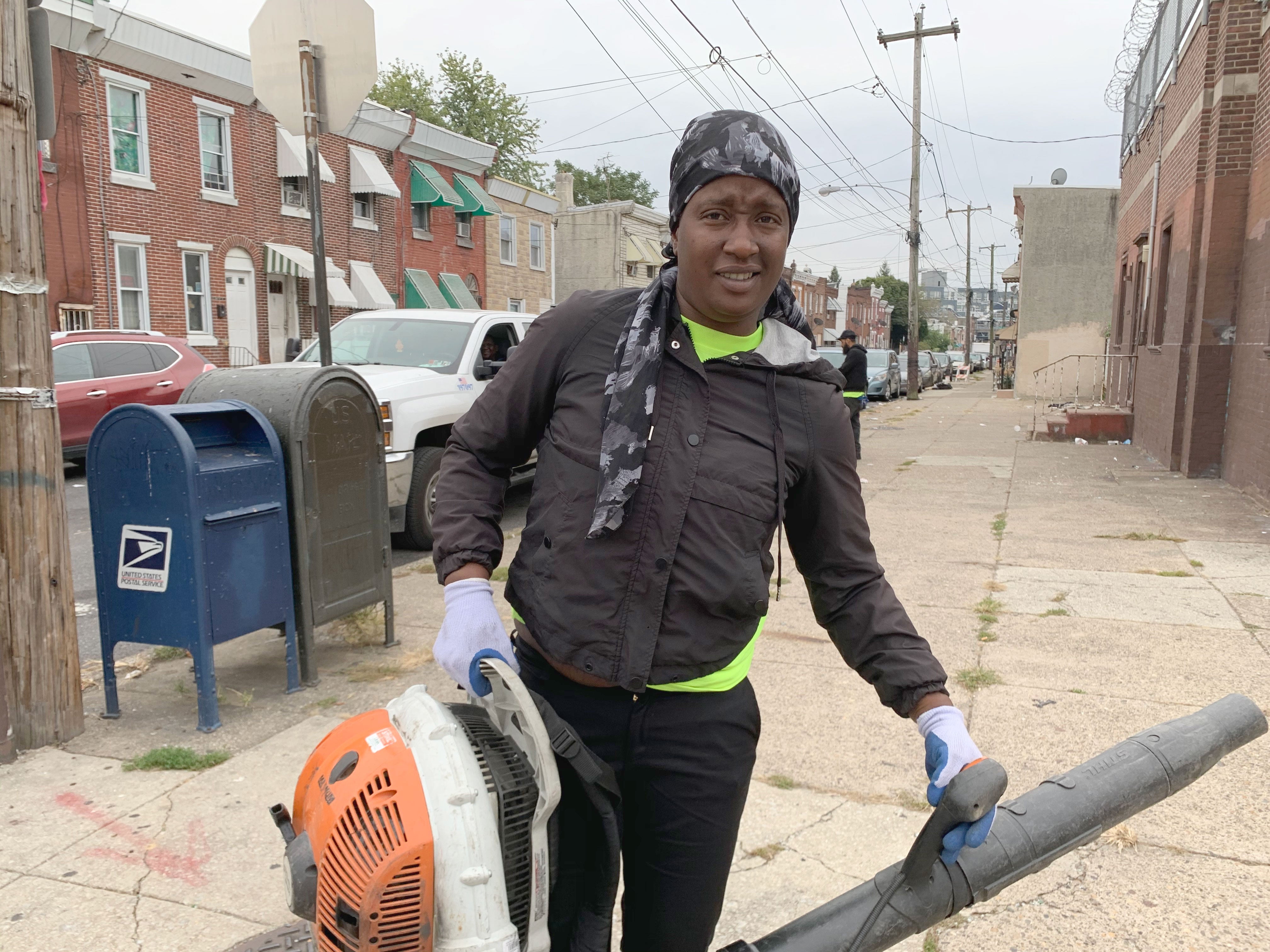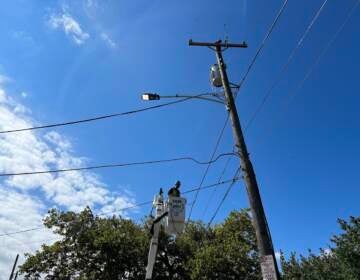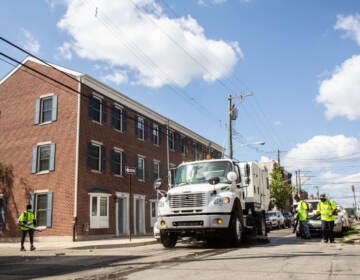Why Philly’s Streets Department is ending its experiment with leaf blowers
Philadelphia is moving away from a model for street sweeping that relied on leaf blowers amid complaints that the tools reduced air quality and exposed workers to hazards.

The city's street sweeping pilot in June 2019. (Kimberly Paynter/WHYY)
Last April, Philadelphia launched an experimental street sweeping program in six of the city’s dirtiest neighborhoods. The goal: to test whether sanitation crews could effectively clean city streets without making residents move their cars.
Officials held not one, but two press events to demonstrate this civic magic trick. Armed with gas-powered leaf blowers, sanitation workers pushed trash from curb lines into the center of the street. Then mechanical broom trucks came by and sucked it all up.
Nearly a year later, the city is changing course — sharply — after deeming a big part of that experiment a failure. While the program helped clean up the target neighborhoods, Streets Commissioner Carlton Williams said Thursday that residents will have to move their cars during the next phase of the pilot. Relying heavily on hand-held blowers to sweep the city’s streets just isn’t practical, he said.
“It took too long. We weren’t able to stay on a coordinated schedule,” said Williams during a news conference. “Especially in areas where we had high concentrations of litter.”
Critics also charged that the leaf blowers, devices banned in a few cities, generated noise, exhaust and potentially hazardous dust.
The second phase of the sweeping pilot will cover the same six neighborhoods, but also new ones. The city is still figuring out where the program will be expanded. In 2019, six crews cleaned sections of West Philadelphia, Southwest Philadelphia, Kensington, Strawberry Mansion, Logan and South Philadelphia.
This year’s program is expected to start April 1 and run through the end of November.
Leaf blowers will still be used, but they’ll stop having a starring role in July when the city will begin asking residents to move their cars for sweeping crews. The Philadelphia Parking Authority will start ticketing cars that don’t move during designated street sweeping times in August.
“We need the cars to move to do a thorough and efficient job to get through an area,” Williams said.
Mayor Jim Kenney has said his ultimate objective is to have citywide street-sweeping in place by the end of his term.
“It’ll be in every neighborhood and you are going to have to move your car. If you don’t want to move your car — tough,” Kenney told reporters after his second inauguration ceremony in January.
City to hold hearings on sanitation worker safety
The shift away from leaf blowers comes shortly before a City Council committee is expected to hold a hearing about “the safety and well-being” of workers in the sanitation division of the Streets Department: the men and women pressed into service during the first iteration of the city’s street sweeping pilot.
The hearing aims to open a conversation at City Hall about hazardous working conditions. WHYY/PlanPhilly’s reporting was cited by the council committee in a resolution introduced by Councilmember Cherelle Parker, who chairs the body’s Committee on Labor & Civil Service.
“Our hearing will fully explore any issues impacting the health and well-being of our sanitation workers, who are on the front lines cleaning our city’s streets and sidewalks, while also identifying potential solutions,” said Parker, who represents the 9th District and serves as Majority Leader.
WHYY/PlanPhilly found that sanitation workers assigned to wield leaf blowers in Kensington last year routinely contended with human feces and used drug needles. These markers of the city’s opioid epidemic were particularly hazardous in the face of a 2019 Hepatitis A outbreak, which now appears to be under control, according to the results of a recent city report.

Hepatitis A — a curable, but highly contagious and debilitating liver disease — is primarily caused by a virus transmitted by the so-called fecal-oral route.
“We don’t know what’s on the needles. You know, we got feces we’re blowing,” said Shaketa Armstead, a Streets Department sanitation worker.
City policy requires sanitation workers like Armstead to wear “protective gear,” including reflective vests, steel-toed metal boots and gloves. But it doesn’t require them to wear face masks or safety glasses, though it does provide them.
Union representatives say the masks and glasses that are provided are low-quality and largely ineffective, leaving members vulnerable to disease and potential respiratory problems from the debris and dust that the leaf blowers kick up during the course of a shift.
“The city always finds a way to find money for all the things they want to do, but something as basic as making sure the guys have the proper equipment to do their job, it’s always a fight,” said Omar Salaam, a business agent with AFSCME District Council 33, which represents more than 1,100 Streets Department workers.
Williams has said that worker safety is his department’s “number one priority.” At this time, the Streets Department’s $227 million annual budget does not include money for upgrading the safety goggles and face masks it distributes to workers.
According to an inflation-adjusted analysis by City Council staffers, the Streets Department budget and that of its sanitation division, has remained “effectively flat for at least the past fifteen years” while the division’s workload has grown, according to the resolution calling for hearings.
The resolution also notes that Philadelphia police officers and firefighters receive “hazard pay” to compensate for risky work.
“Now is the time to explore best practices nationwide in terms of ‘hazard pay’ – also called ‘environmental stress pay’ or ‘exposure pay’ – for Sanitation workers,” the resolution states.
WHYY is your source for fact-based, in-depth journalism and information. As a nonprofit organization, we rely on financial support from readers like you. Please give today.







